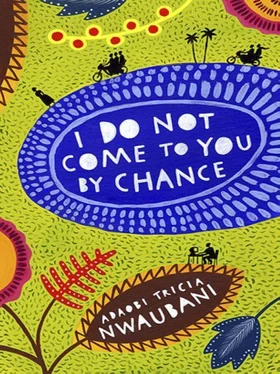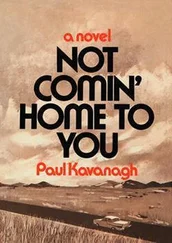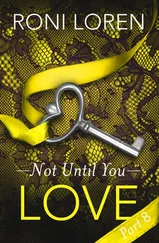She hesitated and looked away.
‘Right now I just need to focus. I’m really under pressure.’
I sighed. Of course. Her schoolwork was bothering her. Sometimes, project supervisors could drive you up the wall and right into the concrete. Ola was so engrossed in her work, she did not want to be distracted by romance. I looked at her with awe; she had just inspired me with fresh admiration.
‘Ola,’ I said in the most understanding of tones. ‘Take it easy, OK? Just let me know when you’ve finished your project and I’ll come and visit you. OK?’
‘Kingsley…’ she began fiercely.
From her face, I could tell that she was composing a different sentence.
‘You’d better know that my mother is very unhappy with you,’ she said eventually.
‘Unhappy with me? Why?’
She averted her eyes.
‘Kingsley, I have to go. Have a safe trip.’
With that, she turned and disappeared inside.
Back at the motor park, I located the vehicle going to Umuahia. The station wagon had almost filled up, when a haggard woman approached. Her bony body was outlined under an oversized blouse that was drawn in at the waist. A grey skirt fell to the middle of her legs, her feet were clad in rugged bathroom slippers. She poked her thin face into my window and informed us that her husband was in very poor health.
‘My brothers and sisters,’ she pleaded, ‘I have nine children and hunger is threatening to kill us. My husband has been very sick for over a year and we have no money for the operation.’
She said that we – those of us in that vehicle – were their only hope of survival. If we would only chip in some funds.
‘My brothers and sisters,’ she begged, ‘please nothing is too small.’
Around her neck hung a cloth rope attached to a photograph of her husband. In it, the sick man was lying on a raffia mat on the cement floor. He was stark naked and his ribs were gleaming through his skin. There was a growth the size of two adult heads, shooting out from between his bony legs. The faded photograph dangled on her flat chest as she stretched a metal container into the car and jangled the coins that were inside.
As soon as I saw the photograph, it hit me.
I realised what had been missing from Ola’s room, what it was that had been nagging at me all the while I was there. All my photographs – all three of them – had vanished from her room.
The local 7 o’clock news was usually a harmless serving of our state governor’s daily activities – where he had gone, what he had said, whom he had said it to. The national 9 o’clock news was different. It always reported something that infuriated my father.
‘They’re all illiterates!’ he ranted. ‘That’s the problem we have in this country. How can we have people ruling us who didn’t see inside the four walls of a university?’
Two days ago, it was the allegation that one of the prominent senators had falsified his educational qualifications. He had lived in Canada for many years, quite all right, but the University of Toronto had no record of his attendance. Yesterday, it was the news that the Nigerian government had begun a global campaign to recover part of the three billion pounds embezzled by the late General Sani Abacha administration. About $700 million discovered in Swiss bank accounts had already been frozen. Today, it was the news that one of the state governor’s convoys had been involved in a motor accident. This was the fourth time this same governor’s convoy had been involved in a fatal car crash.
‘And the most annoying thing,’ my mother added, ‘is that he’s going to go scot-free.’
‘Did anyone die?’ Charity asked.
‘Were you not listening?’ Eugene replied.
‘One woman died,’ Godfrey answered. ‘The other one is in hospital.’
The governor’s press secretary was careful to add that the injured woman’s medical bill was being catered for at the governor’s expense.
‘It’s taxpayer’s money!’ My father exploded from his chair.
‘But why can’t they investigate what the problem is?’ my mother asked. ‘Why can’t they ask why this same man has had four accidents in this period?’
‘Illiterates… all of them… that’s the problem.’
Had I been less preoccupied with other matters, I would have supplied the answer to that question for free. After the third accident, I had read an interview in which this same governor’s press secretary had blamed the governor’s enemies, insinuating that they had used a powerful juju to engineer these mishaps in order to embarrass the governor.
Before the news ended, my father had had enough. He stood up and hissed.
‘I’m going in,’ he said.
My mother followed.
Shortly after, Godfrey dived towards the television and tuned to a channel that was just starting to show a Nollywood movie. I was not a fan of these locally produced Nigerian movies, so I also stood and went into the children’s room.
Sleep refused to happen. Three days after my visit to Ola, my mind was still bustling with worry. What was it that her mother was unhappy with me about? Perhaps she and Ola were having a misunderstanding. Perhaps she was angry that I had not been to visit her as regularly as I should have. But then, the woman was always busy. Ola’s mother, for the earlier part of her married life, had been a contented housewife. She was forced to start her own business only after her husband defected to some other woman. Now she owned a busy pepper-soup joint somewhere in the middle of town, which she ran with an almost fanatical zeal.
This mystery was going to torment me forever. There was no better way to regain my peace of mind than to pay her a visit tomorrow.
I decided to walk. As I tried my best to avoid the speeding cars and the gaping gutters, I was amazed to see how much this obscure town was developing just a few years after Abia State had been carved out of Imo State, and Umuahia made the capital. There were several more cars on the roads, and neon signs announcing new businesses. There were more and more posters advertising the political intentions of… almost everybody. The scallywags hired to post these bills did not spare any available space in the pursuit of their endeavours. Faces of candidates were posted over traffic signs, and faces over the faces of other contestants. There were even faces posted on dustbins. Did these people not realise the subconscious message of seeing a candidate’s hopeful face grinning from a container specially prepared for garbage? Perhaps most of them did not go to school.
A red car zoomed past and nearly broomed me off the road.
‘Hei!’ I cried while struggling to keep myself from tumbling into the gutter.
These parts were largely populated by civil servants and traders; the most ostentatious they aspired to was a Mercedes-Benz V-Boot. Anybody riding such an extraterrestrial car must either be a dealer in human body parts or a 419er – a swindler of men and women in distant lands, an offender against section 419 of the Nigerian Criminal Code, which addresses fraudulent schemes.
‘Criminal!’ I hissed after the flashy vehicle. Was it his dirty money that had constructed the road?
Ola and I had done this journey between her house and mine several times before. It was best enjoyed in the late evening – when there were fewer cars on the road, when the ill-tempered sun was taking its leave, when a fresh breeze was fanning the skin. Walking with Ola was magical. We would take slow steps and talk about everything – our dreams, our fears, what happened to us during the day, how we had spent our time. Usually, I did most of the serious talking. But once in a while, she raised some heavy issues.
‘My mother was asking me some things about you today,’ she said sometime towards the end of my stay in school.
Читать дальше





![Майкл Азеррад - Come as you are - история Nirvana, рассказанная Куртом Кобейном и записанная Майклом Азеррадом [litres]](/books/392533/majkl-azerrad-come-as-you-are-istoriya-nirvana-ra-thumb.webp)






